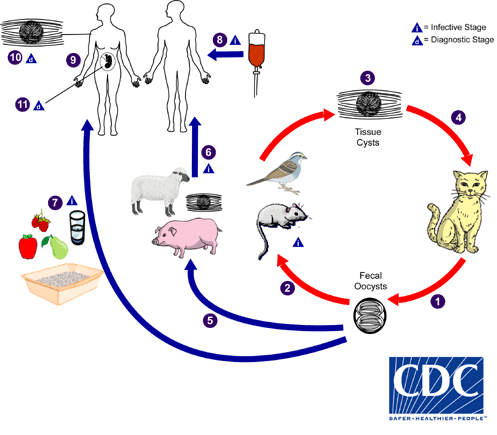
Unsupported: There is no current scientific evidence supporting an association between T. gondii and increased levels of the hormone ghrelin.

FULL CLAIM: “It’s the cat parasite [...] Once it's in the body it's called toxoplasmosis, and this parasite is so intelligent [...] they send signals to the nervous system to different parts of the impulse control to release ghrelin hormone, or hunger hormone, that starve you of glucose, so you're just craving sugar and craving sweets. This then leads to depression, highs and lows, irregular heartbeat, muscle twitching, brittle hair, dry skin, psoriasis, unregulated sleep cycles”
REVIEW
Toxoplasmosis is a disease caused by an infection with the parasite Toxoplasma gondii. This parasite is most commonly found in contaminated food, such as raw and undercooked meat. It can also be found in cat feces.
Symptoms of toxoplasmosis are similar to those of the flu, but many people, particularly those with healthy immune systems, don’t show signs of infection at all. However, infants of mothers infected with T. gondii during pregnancy and immunocompromised people are at greater risk of developing severe toxoplasmosis, which can damage the brain, eyes, and other organs.
A Facebook reel shared on 6 June 2024 claimed that a so-called “cat parasite” causes toxoplasmosis. It also claimed that toxoplasmosis leads to an increased release of the ghrelin hormone (commonly known as the “hunger hormone”), which in turn leads a host of other health issues including “depression, highs and lows, irregular heartbeat, muscle twitching, brittle hair, dry skin, psoriasis, [and] unregulated sleep cycles”.
The reel’s content originally comes from an interview with Chervin Jafarieh on the podcast Almost 30. The podcast episode, titled “Parasites In Our Culture, Schools, Society + Self with Chervin Jafarieh” was posted on YouTube on 30 May 2023.
Jafarieh has more than 240,000 followers on Instagram and describes himself as the “visionary Founder and Chief Scientific Officer of Cymbiotika” on his website. Cymbiotika is an online supplement store that sells products which allegedly promote weight loss. Jafarieh’s website and LinkedIn share no evidence of medical credentials or scientific training.
The “cat parasite” claim has received media attention in the past, primarily addressing the potential link between T. gondii, mental illness, and risk-taking behavior. However, there is no apparent evidence for an association between toxoplasmosis and an increase in the ghrelin hormone. We explain below.
What is the link between toxoplasmosis and cats?
T. gondii is a protozoan, or single-celled, parasite. It can reproduce asexually and sexually and needs living hosts to survive. According to the U.S. Centers for Disease Control and Prevention (CDC), “[t]he only known definitive hosts for Toxoplasma gondii are members of family Felidae (domestic cats and their relatives)”.
While humans can’t act as hosts for the sexual reproduction of T. gondii, the parasite can be transmitted to humans, as shown in Figure 1 below. This transmission occurs via fecal shedding from cats, which can contaminate food and water that is eventually consumed by humans. Inadvertent handling of cat feces in litter boxes or outdoor environments can also result in T. gondii transmission.

Figure 1 – Life cycle of T. gondii infection. Transmission of the parasite to humans can occur through contaminated food and water (5, 6, 7), cat litter (7), blood transfusions (8), and transplacentally from mother to fetus (9). Source: CDC.
Notably, toxoplasmosis often resolves itself in the majority of people who become infected. From the CDC:
“Acquired infection with Toxoplasma in immunocompetent persons is generally an asymptomatic infection. However, 10% to 20% of patients with acute infection may develop cervical lymphadenopathy and/or a flu-like illness. The clinical course is usually benign and self-limited; symptoms usually resolve within a few weeks to months.”
In short, toxoplasmosis infection presents a low risk to people with healthy immune systems. Higher risk groups, such as pregnant or immunocompromised people, can reduce their risk of exposure to T. gondii by way of relatively simple daily habits such as hand washing or wearing gloves while gardening.
No current evidence for an association between toxoplasmosis and increased ghrelin
While there is some evidence of an association between toxoplasmosis and certain psychiatric disorders[1,2], we were unable to find evidence supporting an association between toxoplasmosis and increased levels of the hormone ghrelin, nor did Jafarieh offer any during the interview. Science Feedback reached out to Jafarieh for evidence of this claim and will update this review pending his response.
A search on PubMed#, a repository of published scientific studies hosted by the U.S. National Institutes of Health, yielded just one animal study evaluating this alleged association. The authors of the study, Parvin et al., actually found that T. gondii infection reduced ghrelin levels. This contradicts the claim, which suggested that T. gondii increases ghrelin levels.
In short, without concrete evidence, it’s speculative to make the claim that toxoplasmosis leads to increased ghrelin levels and, in turn, the other health issues listed.
Toxoplasmosis isn’t as prevalent in the U.S. as the claim suggested
The claim that “about 60% of the country has toxoplasmosis” is baseless. Toxoplasmosis isn’t a nationally notifiable disease—in other words, one that must be reported to public health officials to help monitor potential disease outbreaks. Because of this, it’s difficult to collect accurate epidemiological data on its prevalence.
Nevertheless, limited existing data show that the figure from Jafarieh’s claim is exaggerated. According to National Health and Nutrition Examination Survey (NHANES) data collected between 2011 and 2014[3], 11% of people above the age of six tested positive for T. gondii antibodies, which can indicate both active and past infections. An April 2024 CDC publication estimated that 40 million people in the U.S. are infected with T. gondii. This is 12% of the current total population in the U.S., which as of 2024 is estimated at 336 million.
NOTES
# PubMed search query: Ghrelin[Title/Abstract] AND (T. gondii[Title/Abstract] OR Toxoplasma gondii[Title/Abstract] OR toxoplasmosis[Title/Abstract]))
REFERENCES
- 1 – Liu et al. (2022) Association between Toxoplasma gondii infection and psychiatric disorders: a cross-sectional study in China. Scientific Reports.
- 2 – Contopoulos-Ionnidis et al. (2022) Toxoplasmosis and Schizophrenia: A Systematic Review and Meta‐Analysis of Prevalence and Associations and Future Directions. Psychiatric Research & Clinical Practice.
- 3 – Jones et al. (2018) Toxoplasma gondii Infection in the United States, 2011–2014. American Journal of Tropical Medicine and Hygiene.


